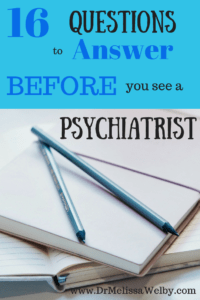Going to see a psychiatrist? Make sure you are ready! Before you come in for your first psychiatrist appointment get prepared by answering the following questions. If you do this, we will spend less time recreating your history and more time talking about the reasons you have come in for the psychiatric appointment. If you are seeing a psychiatrist for the first time try to answer these 16 questions before your appointment. You may find it helpful to write down your answers and bring them to the appointment.
Download and print out a copy of the questions by entering your email here:
If you haven’t yet found a psychiatrist first read the post: 8 Questions You Need to Ask to Get the Best Psychiatrist! This post will also give you tips on how to assess the fit between you and the psychiatrist and make sure it will work for you.
Questions to answer before your psychiatrist appointment:
- Why are you are coming in for an appointment now?
- What are the particular things that are bothering you?
- What would you like help with?
- How far are you from your baseline?
- How would you describe your normal personality? Are you more a cup half-full person or cup half-empty?
- When did you start feeling bad?
- When was the last time you felt happy?
Seeing a psychiatrist for the first time: Know your family history
Try to learn as much as you can about your family’s medical and psychiatric history. In some families, mental health is a taboo topic and not openly discussed. Try to think if there is one person who may be easier to talk to and ask them.
Knowing your family history before your psychiatric appointment can help us to come up with a more accurate diagnosis and plan.
- Does anyone in your family have any psychiatric history?
- Is anyone seeing a psychiatrist? Have they been hospitalized?
- Has anyone been treated with medication? If so, which medicine and was it effective?
Psychiatric appointment: Your past history
If you are going to see a psychiatrist, think about your own past mental health history. If you can’t remember details, ask your family if they remember. You can also contact your previous psychiatrist to see if they still have records.
- Have you seen a psychiatrist before? If you have, find out their contact information (especially their fax number!).
- Have you been in therapy? Was it helpful? What did you like or not like about it?
- Have you been treated with medication before? Was it helpful?
If you are struggling to come up with your medication history see if you can get it from your pharmacy. I have had people be able to get a medication printout for the previous 10 years. Although it can be cumbersome to sort through, it can provide valuable history.
Going to see a psychiatrist? Write out a timeline!
Write up a general timeline for your history and the medicine you have tried. Details to include on the timeline are:
- Approximate dates you took medication and why you took it.
- What were the doses of the medication?
- Were there any side effects? Any benefits?
If we have a list of your past medications, we can come up with a more accurate picture of what works for you and what doesn’t.
What you need to do before seeing a psychiatrist:
Don’t get me wrong. You don’t need to have everything figured out and conceptualized before your first psychiatric appointment. The more questions from this list that you are able to answer before you come in, the more time we get to talk about why you are seeing a psychiatrist. Its win-win!
Do your best to organize your thoughts but don’t stress out about it. It doesn’t need to be perfect. You may find it helpful to write down your answers and bring them to the appointment.
How well do you know your medical history?
Do you know what the plan is to manage your medical diagnosis? What is your medication is for? What can you do to take charge of your health?
You need to be your #1 advocate and that requires you to have a good knowledge of your medical history. Download a form of the questions you need to know by entering your email here:
Looking for additional mental health resources?
Check out the Mental Health Bookstore and Resources page to get helpful options.
Don't miss another post!

Subscribe to get our latest content by email.




Thanks for pointing out that answering the questions does not need to be perfect, but it would help by listing them down. I will share this with my sister since she plans to see one for her daughter. This is because her daughter hasn’t been talking a lot ever since her father died, and, now, my sister has remarried which made her daughter even more isolated.
Great- I hope they find these questions helpful in preparing.
I’ve been feeling down for six months already for no reason so I think I need help with it. Since my personality is usually upbeat, I think it’s abnormal. I haven’t been in therapy before so it might be best if I look around for some psychiatric services to know how to deal with this.
Sounds like a great idea to look into it further! You make it clear this is not your usual state. I hope you feel better soon.
I like how you explain that in some families, mental health is a taboo topic and not openly discussed. My uncle was diagnosed with a mental disease and he hasn’t accepted any treatment. I will recommend him to visit a psychiatrist so that he can get helped.
Thanks for the tip to learn as much as possible about your family’s psychiatric and medical history. My brother wants to go see a psychiatrist later this week. I’ll tell him to talk to our parents about our family’s history so he can give it to a psychiatrist once he finds one he likes.
My mother has a phobia with deep water. We’re considering consulting with a psychologist that may help her out. Well, thank you for elaborating here that a psychiatrist may ask my mom if any of her family members have seemed the same treatment. We’ll also keep in mind to write down the type of medicine that she previously took.
I have my first apointment coming up with my psychiatrist tomorrow Jan.12th. I’m nervous. I have severe anxiety with people. I constantly feel people laugh at me , plot against me and judge me based on my insecurities. I feel they know my problems without telling them anything about me. I isolate and avoid as many social situations as possible. I have no friends and hardly any associates. I hope this new dr. Can help me through all of my issues because I’m always nervous to go around people unless someone is with me. I can’t live like this anymore.
Great that you took this big step to hopefully get some support and treatment. I hope it went well!
My husband is going to see a psychiatrist for the first time next week. My major worry is he isn’t honest about his
problems. He’s known for being a liar.
How will can he get the help he needs from a psychiatrist if he doesn’t see he has a problem but thinks everyone else does?
Your concern is valid. Psychiatrists know what we are told and so it can be tricky if someone isn’t forthcoming about their challenges (or don’t recognize them as their own challenges). Sometimes even without a person telling us it is clear however then it can be tricky to make headway in treatment. If medications are indicated, will the person agree they may be useful and try? Will they engage in therapy? It can be quite helpful to have a family session so that you can discuss your concerns but that is not always feasible. And as always, getting support for yourself can be helpful.
Great list! Knowing the medical history(even if it’s not perfect) is a great way for your psychiatrist to know where you are at.